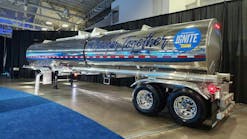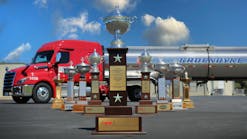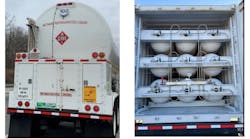The Commercial Vehicle Safety Alliance (CVSA) recently issued an inspection bulletin that addresses safety concerns with roadside inspectors who are conducting inspections on bulk packages that contain natural gas or methane in compressed or refrigerated liquid forms, and hydrogen in a compressed or refrigerated liquid form.
The following information was posted after the Federal Motor Carrier Safety Administration (FMCSA) and Pipeline and Hazardous Materials Safety Administration (PHMSA) became aware of these concerns, the organization said. It’s intended to raise awareness of the issue and provide safety guidance to roadside inspectors for conducting inspections on bulk package shipments of either of these gases or refrigerated liquids.
Background
FMCSA, PHMSA, and CVSA are focused on inspector and driver safety when conducting inspections of these hazardous materials. Due to the rapid changes in worldwide and U.S. markets, increased quantities of natural gas or methane, refrigerated liquid (UN1972) and hydrogen, refrigerated liquid (UN1966) are shipped in MC-338 cargo tanks, cargo tanks meeting the requirements in §180.405(d) or cargo tanks operating under a current special permit. In addition, hydrogen, compressed (UN1049) and natural gas, compressed (UN1971) are shipped in high-pressure bulk cylinders operated under a special permit. Often, these high-pressure cylinders are enclosed in a trailer or freight container. Safety concerns have emerged when roadside inspectors are conducting inspections on these gases.
If any of these gases leak in a confined space, a flammable environment may be created. This is a significant safety concern for roadside inspectors, drivers, and the public.
Hydrogen and natural gas are lighter than air. Air has a vapor density of 1. Hydrogen has a vapor density of 0.07. Natural gas has a vapor density of 0.6. So, both gases are lighter than air but will build up in a confined space. Remember, these gases are odorless.
The gas vapors can be ignited by static electricity, friction, flame, or electronic devices carried by the roadside inspector. These electronic devices include, but are not limited to, radios, body cameras, cell phones, computers/tablets, tasers, and personal radiation detectors.
Some motor carriers and their drivers are reluctant to open the rear compartment of an MC-338 cargo tank or the back of an enclosed trailer containing bulk cylinders during an inspection due to the safety concerns regarding these two gases.
Inspection guidance
When conducting inspections of natural gas or hydrogen in compressed or refrigerated liquid form, we recommend the following safety precautions:
- Cell phones or electronic devices should not be permitted within 25 ft. of the trailer operating compartment. Remove all potential ignition sources possible, if permitted by your agency. Ensure the tractor engine is shut off.
- Before the compartment is opened, ask the driver if they are equipped with a personal air monitor. If they are, have them use the monitor to check for a flammable atmosphere around the trailer.
- Visually inspect the top of and area around the truck vent stack. Look for fumes, plumes, gas vapors. Remember, hydrogen will burn with an almost invisible flame. Do not begin the inspection procedure if there is any evidence of fumes, plumes, gas vapors. Opening a compartment can ignite vapor.
- When opening the rear of an enclosed trailer or the rear compartment of an MC-338 cargo tank, stand at least 10 ft. to the side of the trailer and avoid being downwind while the driver opens the doors.
- Observe the compartment or trailer, looking and listening for signs of a leak or other hazards.
- Let the trailer or compartment air out for at least one minute before approaching and completing your inspection.
- Have the driver close the doors when you are finished inspecting the necessary components.
If a driver refuses to open the rear of a trailer or rear compartment of a cargo tank and expresses safety concerns, follow your departmental policy on how to proceed. In this situation, the hidden items in the compartment do not fall under the hidden component policy; therefore, the trailer will not be eligible for a CVSA decal.
Visit cvsa.org for more information.









